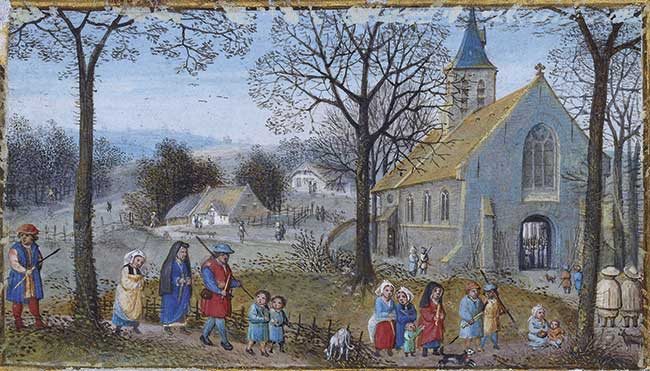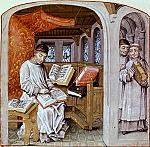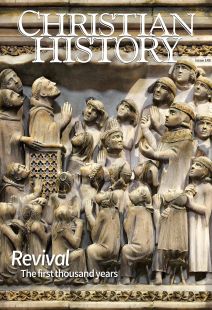Did you know? Medieval Renewal

[ABOVE—Simon Bening, Villagers on Their Way to Church, Tempera colors and gold paint on parchment, c.1550—Public domain, Wikimedia File:Simon Bening - Villagers on Their Way to Church - Google Art Project.jpg]
Was there faithful preaching?
I also admonish and exhort the brothers that in their preaching their words be studied and chaste, useful and edifying to the people, telling them about vices and virtues, punishment and glory; and they ought to be brief, because the Lord kept his words brief when he was on earth.—from the Franciscan Rule of 1223
But tell me: what would become of this world, I mean of the Christian faith, if there were no preaching? Within a very little our faith would have perished, for we should believe nothing of that which we now believe. And because of this holy church has ordered that every Sunday there shall be preaching. . . .
And she has ordered you to go to hear Mass, and if of these two duties you can perform but one . . . you should rather lose Mass and hear the preaching . . . you do not so endanger your soul by not hearing Mass as by not listening to the preaching.—from a sermon of Bernardino of Siena (1380–1444), translated by H. J. Robins
[Margery] was excluded from the sermon, which was to her the highest comfort on earth when she could hear it, and equally the greatest pain on earth, when she could not hear it.—from the Book of Margery Kempe, c. 1430s, quoted in CH #127
Was there fervent prayer?
[Catherine’s] first petition, therefore, was for herself. The second was for the reform of holy church. The third was for the whole world in general, and in particular for the peace of Christians who are rebelling against holy church with great disrespect and persecution. In her fourth petition she asked divine providence to supply in general and in particular.—from the Dialogues of Catherine of Siena, c. 1377–1378, as translated in CH #30
Jesus Lord, well of all goodness,
For thy great pity I thee pray:
Forgive me all my wickedness
Wherewith I have grieved thee today.
—from a 15th-c. prayer in MS Ashmole 61 at the Bodleian Library, spelling modernized by the blog A Clerk of Oxford
Was there conviction and repentance?
It is, therefore, plain which faith is the foundation of the church—the faith with which the church is built upon the Rock, Christ Jesus, for it is that by which the church confesses that “Jesus Christ is the Son of the living God.”—from De Ecclesia (1413–1414) by Jan Hus, translated by David Schaff
The faithful . . . know how totally they need Jesus and him crucified. While they admire and embrace in him the charity that surpasses all knowledge, they are ashamed at failing to give what little they have in return for so great a love and honor.—from On Loving God (1153) by Bernard of Clairvaux, translated in CH #49
One day, however, when the gospel story of Christ sending his disciples to preach was read in the church, the holy man of God [Francis of Assisi] was present. . . . After mass he humbly asked the priest to explain the gospel to him. He heard that Christ’s disciples were supposed to possess neither gold, nor silver, nor money; were to have neither bread nor staff; were to have neither shoes nor two tunics; but were to preach the kingdom of God and penance.
When the priest had finished, Francis, rejoicing in the spirit of God, said, “This is what I want! This is what I’m looking for! This is what I want to do from the bottom of my heart!”—from The Life of Saint Francis (1228) by Thomas of Celano, translated by David Burr on the CHI website
Was the love of God felt?
The place which Jesus takes in our soul he will nevermore vacate, for in us is his home of homes, and it is the greatest delight for him to dwell there.—from the Showings of Julian of Norwich, c. 1373, translated in CH #30
Give Christ his place then, but deny entrance to all others. For when you have Christ you are rich and he is sufficient for you. He will provide for you and supply your every need.—from The Imitation of Christ by Thomas à Kempis, c. 1418–1427, translated on the CHI website
Did people criticize RENEWAL movements?
For some time, indeed, between prelates and rectors, of priests and clerics of parish churches . . . and the brothers of the Dominican and Franciscan orders . . . a grave and perilous dispute has been stirred up about sermons given to the congregations of the faithful, about hearing their confessions and enjoining penances on them, and about burying the bodies of those of the dead who are known to prefer burial in the churches or places of the friars.—Boniface VIII, Super Cathedram (1300), translated by the Pontifical Committee for Historical Sciences
Christ gave his gospel to the clergy and the learned doctors of the church so that they might give it to the laity and to weaker persons. . . . But this Master John Wyclif translated the gospel from Latin into the English. . . . And Wyclif, by thus translating the Bible, made it the property of the masses and common to all and more open to the laity, and even to women who were able to read.—Henry Knighton (d. 1396), Augustinian canon at St. Mary of the Meadows, as quoted in CH #3 CH
By the editors
[Christian History originally published this article in Christian History Issue #149 in 2023]
Next articles
Editor's note: Medieval revivals
Looking at the big picture of renewal in church history
Jennifer Woodruff TaitAlways reviving
The Christian movement has gone through continual cycles of revival and renewal
Jennifer Woodruff Tait






